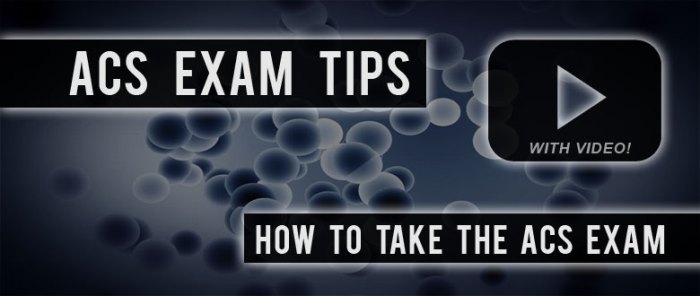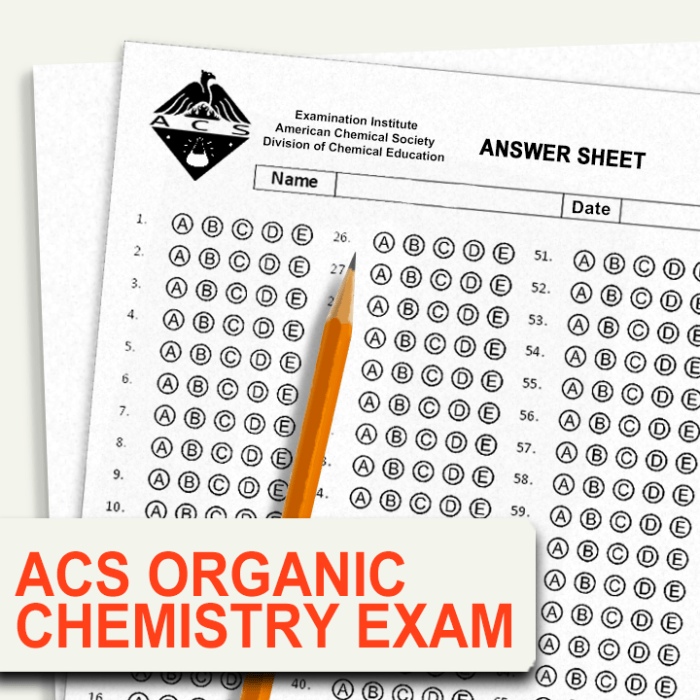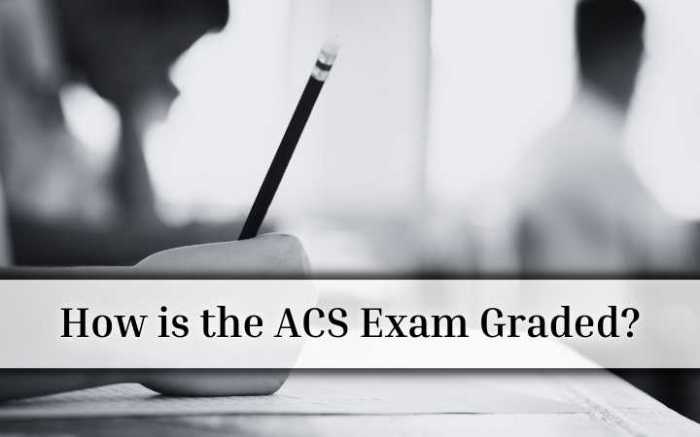Acs practice exam physical chemistry – Embark on an enriching journey with the ACS Practice Exam for Physical Chemistry. This invaluable resource empowers you to gauge your understanding, refine your problem-solving skills, and elevate your preparation for the actual exam. Delve into the intricacies of thermodynamics, kinetics, quantum mechanics, and spectroscopy, and emerge with a profound grasp of the subject matter.
The practice exam meticulously mirrors the format and content of the actual exam, providing a comprehensive assessment of your knowledge. Engage with a diverse range of problem types, including multiple choice, short answer, and computational challenges, honing your critical thinking and problem-solving abilities.
ACS Physical Chemistry Practice Exam Overview
![]()
The ACS Physical Chemistry Practice Exam is a comprehensive assessment tool designed to help students prepare for the American Chemical Society (ACS) Physical Chemistry Exam. This exam is a standardized test that evaluates a student’s knowledge and understanding of fundamental physical chemistry concepts.
Taking the ACS Physical Chemistry Practice Exam offers several benefits. Firstly, it provides students with an opportunity to familiarize themselves with the format and content of the actual exam. This helps them identify areas where they need additional preparation and focus their studies accordingly.
Secondly, the practice exam helps students assess their current level of understanding and identify areas where they need improvement. This allows them to adjust their study strategies and focus on specific topics that require more attention.
Purpose of the Practice Exam
The primary purpose of the ACS Physical Chemistry Practice Exam is to provide students with an opportunity to practice solving problems and applying their knowledge of physical chemistry concepts in a timed environment. This helps them develop their problem-solving skills, improve their time management abilities, and build confidence in their preparation for the actual exam.
Exam Format and Content

The ACS Physical Chemistry Practice Exam simulates the format and content of the actual ACS Physical Chemistry Exam. It consists of 100 multiple-choice questions divided into four sections:
- Thermodynamics(25 questions)
- Kinetics(25 questions)
- Quantum Mechanics(25 questions)
- Spectroscopy(25 questions)
The topics covered in each section are as follows:
Thermodynamics
- The first law of thermodynamics
- The second law of thermodynamics
- The third law of thermodynamics
- Thermochemical cycles
- Phase equilibria
- Chemical equilibrium
Kinetics
- Reaction rates and rate laws
- The Arrhenius equation
- Transition state theory
- Catalysis
- Gas-phase reactions
- Solution-phase reactions
Quantum Mechanics
- The Schrödinger equation
- Atomic orbitals
- Molecular orbitals
- Spectroscopy
- Nuclear magnetic resonance (NMR)
- Electron paramagnetic resonance (EPR)
Spectroscopy, Acs practice exam physical chemistry
- Molecular spectroscopy
- Atomic spectroscopy
- Mass spectrometry
- Chromatography
- Electrochemistry
- Surface science
Problem Types

The ACS Physical Chemistry Practice Exam encompasses a variety of problem types, each designed to assess different aspects of the candidate’s understanding of the subject matter.
These problem types can be broadly categorized into the following:
Multiple Choice Questions
Multiple choice questions present candidates with a question or statement followed by several possible answers. Candidates must select the single best answer from the options provided.
- Example: Which of the following is the correct expression for the equilibrium constant of a reaction?
- K = [products]/[reactants]
- K = [reactants]/[products]
- K = [products] – [reactants]
- K = [reactants] + [products]
Short Answer Questions
Short answer questions require candidates to provide a concise written response to a question or prompt. Answers may involve providing definitions, explaining concepts, or solving simple problems.
- Example: Define the term “entropy”.
- Entropy is a measure of the disorder or randomness of a system.
Computational Problems
Computational problems require candidates to perform calculations or solve problems using mathematical equations or formulas. These problems may involve numerical calculations, unit conversions, or the application of physical chemistry principles.
- Example: Calculate the pH of a solution with a hydrogen ion concentration of 1.0 x 10^-5 M.
- pH = -log[H+] = -log(1.0 x 10^-5) = 5
Study Strategies

Preparing for the ACS Physical Chemistry Practice Exam requires a comprehensive approach that combines efficient study habits with access to relevant resources. This section offers valuable tips and strategies to enhance your preparation and increase your chances of success.
To begin, it is crucial to establish a dedicated study schedule that allocates sufficient time for reviewing concepts, solving practice problems, and seeking clarification on challenging topics. Consistency in your study routine is key, so aim to set aside regular study hours and adhere to them as much as possible.
Recommended Study Resources
Supplement your classroom notes and textbooks with additional study materials to reinforce your understanding of physical chemistry concepts. Consider utilizing the following resources:
- Textbooks:Refer to reputable textbooks that provide in-depth coverage of physical chemistry topics, such as Atkins’ “Inorganic Chemistry” or McQuarrie and Simon’s “Physical Chemistry: A Molecular Approach.”
- Online Courses:Enroll in online courses offered by platforms like Coursera or edX to gain access to structured lessons, video lectures, and interactive exercises.
- Practice Problems:Solve numerous practice problems to develop your problem-solving skills and identify areas where you need additional support.
Exam Day Tips
Taking the practice exam under realistic conditions is crucial for success on the actual exam. This section provides essential advice for managing your time effectively, utilizing appropriate test-taking strategies, and maintaining focus during the exam.
Time management is critical. Familiarize yourself with the exam format and allocate time wisely for each section. Avoid spending excessive time on any one question. If you encounter a particularly challenging question, move on and return to it later if time permits.
Test-Taking Strategies
Employ effective test-taking strategies to maximize your score. Read the instructions carefully and understand the question types. Eliminate incorrect answer choices by process of elimination. Guess intelligently if you are unsure, but be mindful of the potential penalty for incorrect answers.
Staying Calm and Focused
Maintaining calmness and focus throughout the exam is essential. Take deep breaths and avoid becoming overwhelmed. Visualize yourself succeeding and focus on one question at a time. Remember that the practice exam is a valuable learning experience, regardless of your performance.
Using the Practice Exam to Improve

The practice exam is a valuable tool for identifying areas where you need to improve your understanding of physical chemistry concepts and problem-solving skills. By carefully reviewing your results, you can pinpoint specific topics or types of problems that you struggled with and focus your studying accordingly.
Reviewing the Practice Exam
To effectively review the practice exam, start by going over each question and checking your answers against the answer key. Note any questions that you answered incorrectly or that you were unsure about. Then, go back and review the corresponding sections in your textbook or notes to reinforce your understanding of the concepts tested.
Learning from Mistakes
It is important to learn from your mistakes on the practice exam. When you come across a question that you answered incorrectly, take the time to analyze why you made the mistake. Was it a lack of understanding of the concept? A misapplication of a formula? Or a simple calculation error? Once you have identified the reason for your mistake, you can take steps to correct it.
For example, if you made a mistake because you did not understand the concept, you may need to review the corresponding section in your textbook or notes more thoroughly. If you made a mistake because you misapplied a formula, you may need to practice using that formula more.
And if you made a mistake because of a calculation error, you may need to practice your math skills.
By carefully reviewing your practice exam results and learning from your mistakes, you can identify areas where you need to improve and focus your studying accordingly. This will help you to improve your understanding of physical chemistry concepts and problem-solving skills, and ultimately increase your chances of success on the actual exam.
Additional Resources
The ACS Physical Chemistry Practice Exam is a valuable resource for students preparing for the actual exam. In addition to the practice exam, there are a number of other resources available to help students prepare for the exam. These resources include:
Websites
- The American Chemical Society (ACS) website provides a number of resources for students preparing for the ACS Physical Chemistry Practice Exam, including a study guide, practice problems, and a list of frequently asked questions.
- The Khan Academy website provides a number of free video tutorials on physical chemistry topics that can be helpful for students preparing for the ACS Physical Chemistry Practice Exam.
- The Crash Course website provides a number of free video tutorials on physical chemistry topics that can be helpful for students preparing for the ACS Physical Chemistry Practice Exam.
Forums
- The ACS Physical Chemistry Practice Exam Forum is a great place for students to ask questions and get help from other students and experts.
- The Khan Academy Physics Forum is a great place for students to ask questions and get help from other students and experts.
- The Crash Course Physics Forum is a great place for students to ask questions and get help from other students and experts.
Other helpful materials
- The ACS Physical Chemistry Practice Exam Study Guide is a comprehensive guide to the exam that includes practice problems, a review of the exam content, and tips for success.
- The Khan Academy Physical Chemistry Textbook is a free online textbook that covers the topics tested on the ACS Physical Chemistry Practice Exam.
- The Crash Course Physical Chemistry Book is a free online book that covers the topics tested on the ACS Physical Chemistry Practice Exam.
Common Queries: Acs Practice Exam Physical Chemistry
What is the purpose of the ACS Practice Exam for Physical Chemistry?
The practice exam serves as a diagnostic tool, enabling you to assess your understanding of the subject matter, identify areas for improvement, and refine your exam preparation strategies.
What topics are covered on the practice exam?
The practice exam encompasses a comprehensive range of topics central to physical chemistry, including thermodynamics, kinetics, quantum mechanics, and spectroscopy.
What types of problems can I expect on the practice exam?
The practice exam features a variety of problem types, mirroring those encountered on the actual exam. These include multiple choice questions, short answer questions, and computational problems, designed to challenge your critical thinking and problem-solving skills.
How can I use the practice exam to improve my preparation?
By reviewing your performance on the practice exam, you can identify areas where you excel and areas that require further study. This enables you to focus your efforts and optimize your preparation for the actual exam.